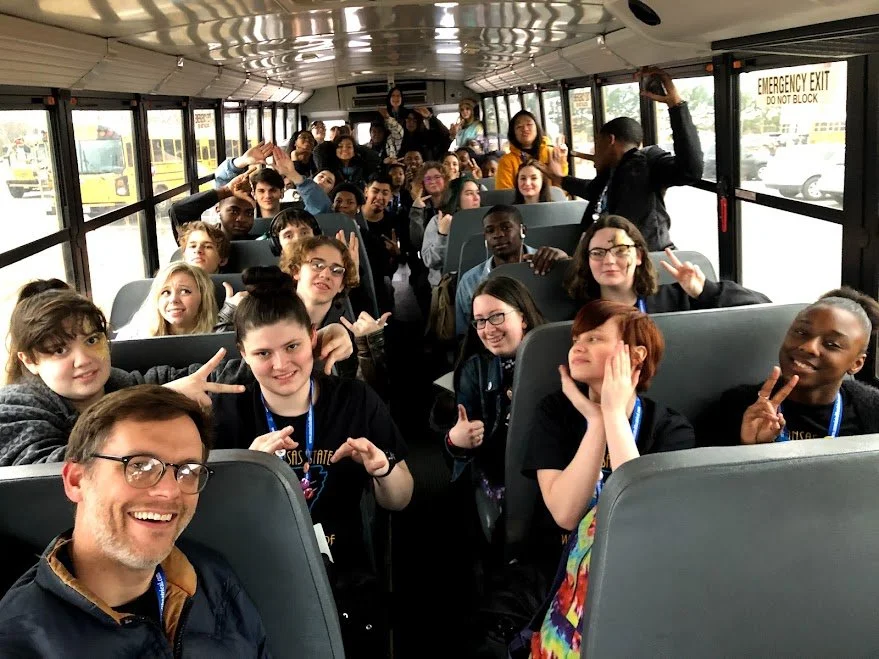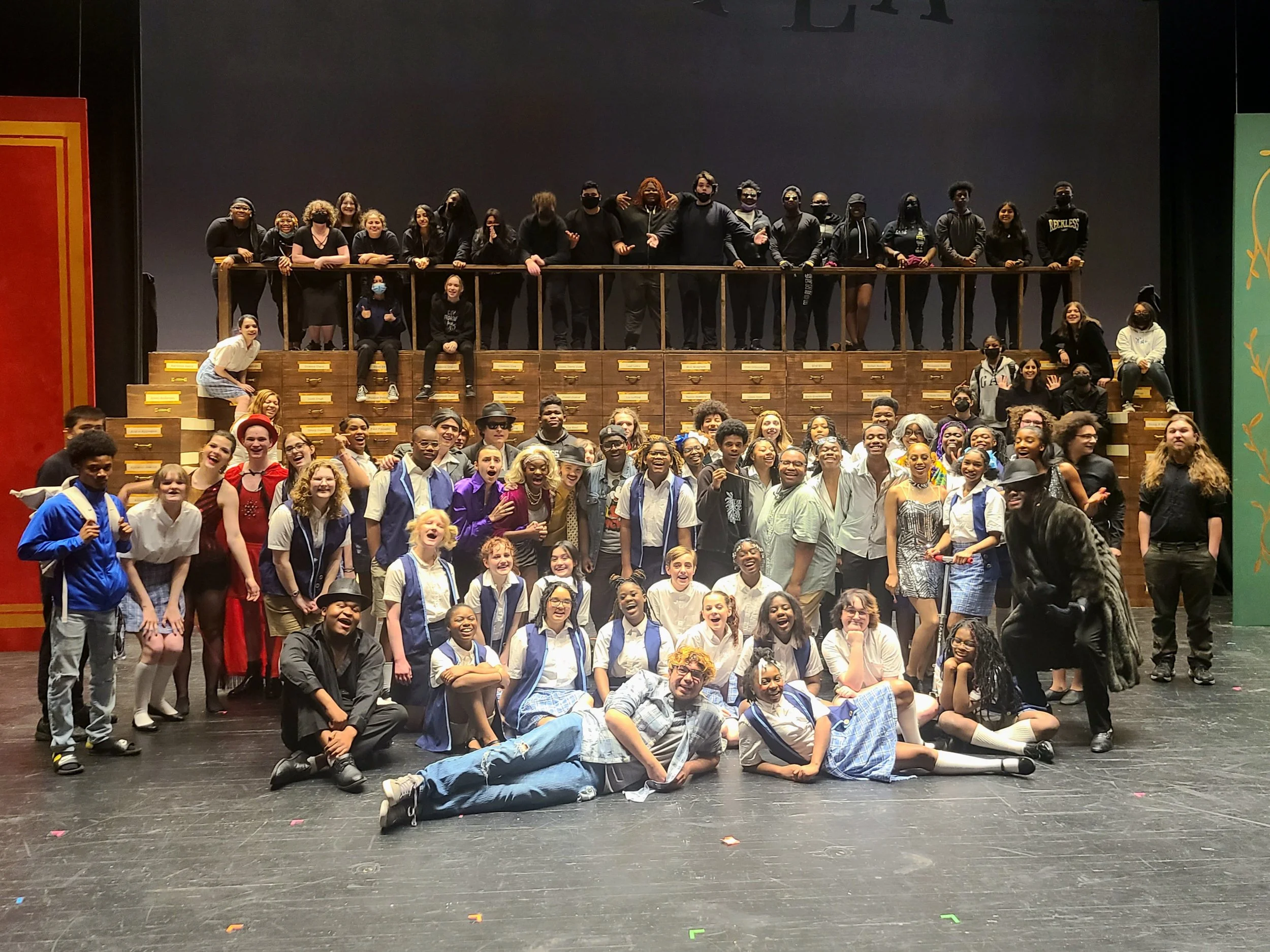Little Rock educator to be honored at 2022 Gala
Spencer Sutterfield, front left, is “one of the most inspiring theater teachers I’ve had the honor to know,” says T2 Arts Engagement Director Morgan Hicks.
Theater educator Spencer Sutterfield was a young boy struggling with dyslexia when he first felt the pull of theater.
“When I was in middle school, I was really struggling,” he explains. “I'm a high achiever, and I want to be successful, but I was dealing with all of the academic challenges that come from being a student with a specific learning disability. I lived in Morrilton, Arkansas, and I got to see a play there for the first time. It really just completely changed my life—I thought, ‘I want to be involved in that.’ The next year, though, I was still too young, I went ahead and auditioned for a show, and I got a part, just as an extra in the production—the drama teacher was really kind to make a spot for me. And, from there on, I was hooked, and I knew that I wanted to pursue theater in college. But I also knew that I wanted to do it in a way that would allow me to give back in the same way that my high school theater experience had helped me. So I specifically pursued a degree in theater education.”
Today, Sutterfield is the department chair for the theater and film department at Parkview Arts and Science Magnet High School in Little Rock. His work there is exemplary enough to have caught the eye of the education department at TheatreSquared. On May 12, Sutterfield will be given the Arts Educator Award at the 2022 Gala for Access and Education. The Gala helps to fund T2’s educational outreach to tens of thousands of students and their teachers from Northwest Arkansas to the Delta Region, working to ensure that all Arkansas students have access to live performances and arts-based learning tools. T2 also provides professional development opportunities across Arkansas for teachers like Sutterfield.
“Spencer is truly one of the most inspiring theater teachers I’ve had the honor to know.,” says T2 Arts Engagement Director Morgan Hicks. “His artistic work at Parkview sets a standard for excellence. With a deep commitment to elevating student voice, respecting individual experience, and building empathy throughout his community, his work serves as an example for his students, his colleagues and teachers throughout the state.”
“Matilda” was Park View’s first full-scale, live musical since the beginning of the pandemic.
But what others see as extraordinary, Sutterfield just sees as his calling, what he was meant to do.
“We just closed our spring musical production yesterday,” he says. It was the first large-scale, full musical production at Parkview since the pandemic started in March 2020. “When the curtain fell, we were going to take a cast and crew photo. And I went backstage, and it was just waterworks everywhere—everybody was crying. And I was just struck by how deeply the students had connected to this experience that they were in because putting on a large scale musical is not an easy process. We had to push really hard to get the product where we wanted it to be. They endured long rehearsal hours and frustrating technical issues, but, in the end, they experienced a deep satisfaction. And I feel like that's really the goal of our program. What I try to do as a teacher is to teach students that, through grit and determination and collaboration and communication, you can push past difficult circumstances to achieve deeply rewarding things.
“Having the chance to see the students respond, especially after the pandemic, was an encouragement and reminder to me because there's been, and still are, lots of challenges that have come from trying to do this kind of work.”
The musical the school just closed was “Matilda”, a huge, complex show with a large cast and full orchestra—it’s obvious that Sutterfield and Parkview do not shy away from challenges.
“Parkview is one of the few schools in the state at this point that uses a live student orchestra,” he says. “So we had a live orchestra, and the music was completely played by students. It was a pretty significant challenge, because of the complexity of the music. But, as it always seems to happen, it did come together, and I was happy to put my name behind it. We are back in the game.”
Because of his experiences growing up, Sutterfield is well aware that theater education goes far beyond instructing a student how to perform onstage or how to build or design elements behind the scenes.
“I think that the value of theater education includes the soft skills that are cultivated from participating in the arts,” he says. “‘Soft skills’ sounds soft, like those skills are maybe not the most significant. But the truth is that those are the skills that are ultimately going to see someone through to success. The emotional intelligence theory tells us that, having those skills, you can navigate social interactions, you can manage your own emotions, you can find that inner grit to will yourself forward. And, ultimately, that's the thing that's going to help cultivate your long term success.”
Sutterfield is now in the 15th year of his teaching career. Every year, he says, brings more reassurance that he is where he needs to be.
“I feel like I came into teaching with a certain amount of idealism,” he says. “In the past 15 years, I have kind of come down to Earth and realized there's a whole lot of challenges that come along with the job. Teachers are faced with a lack of resources or just students who are experiencing their own levels of trauma that have an impact on daily operations in class. But I also wake up and feel validated in the work that I'm doing. I have, at various points in my career, thought about what other occupation or job might be out there. But, ultimately, I don't think that there's any job that I could have that would be more satisfying than the work of creating these opportunities for my students to find themselves, to have this community, to learn the skills necessary for them to be successful in life, whether they pursue the arts or not beyond high school.”



